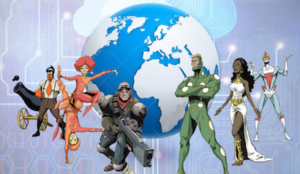 The nonprofit organization Knowbility now has 27 nonprofits and artists that have signed up to participate in OpenAIR2018 and get new web sites via its acclaimed hackathon, which takes place in February and March 2018. There is room for a few more nonprofits, NGOs, charities and artists – but now, Knowbility is turning its attention to recruiting web design teams.
The nonprofit organization Knowbility now has 27 nonprofits and artists that have signed up to participate in OpenAIR2018 and get new web sites via its acclaimed hackathon, which takes place in February and March 2018. There is room for a few more nonprofits, NGOs, charities and artists – but now, Knowbility is turning its attention to recruiting web design teams.
OpenAIR web design teams are volunteers-turned-superheroes. They receive training and mentoring from some of the nation’s most prominent web design accessibility experts as they design new web sites for participating client organizations and artists. Design teams have about five weeks after the start date on February 8, 2018 to create these web sites that comply with ADA and Section 508 standards. The training and mentoring that design teams receive is valued at over $4,000 – but participating web design teams pay just $150.
Web sites are judged by Knowbility’s judging panel over a six week period (the nonprofits and artists get access to the designs to use on their own sites as soon as the design period is over, but team original designs are preserved for judging). Awards will be announced in May during Knowbility’s John Slatin AccessU accessibility conference.
OpenAIR web design teams can be professional web designers, university faculty, university students – anyone who has designed web sites but wants to take their skills to the next level.
This is a great opportunity not only to get top-notch training in web design accessibility; it’s also a fantastic opportunity to:
- enhance your virtual team skills and brag about being involved in virtual volunteering
- be a part of an internationally-recognized event
- help nonprofits that are addressing a variety of causes – fair housing, help for seniors, children’s education and more
- gain recognition for your individual or your company’s corporate social responsibility focus / philanthropy
- compete with other web designers
Your team could be the IT staff from a government agency. Or the entire IT department at a large corporation. Or staff from a savy hot tech startup. Or university students. Or university faculty. If you are an individual web designer, you can register as an individual and you will be matched with a team that has room for you or with other individuals who want to participate and join a team. Teams must have at least 4 members and no more than 6.
After the competition, Knowbility also asks design teams to guide their client organization’s through the process of replacing their current web site with the one the design team has developed, and to provide some initial guidance to the nonprofit in case they have any difficulties with their new site. This is not a requirement, but the guidance is greatly appreciated by the nonprofit clients (otherwise, the guidance will be provided by Knowbility).
A fee of $150 per team is due at registration. If you are an individual, note in your registration that you want to be a part of a team; you can work out how to pay your registration once your team is finalized.
Teams may register with a nonprofit or artist they already have a relationship with (however, there is also a $100 nonprofit registration fee – and if the nonprofit client or artist has to register ASAP, because the window for those registrations is FAST closing!).
Register ASAP! I suggest a deadline of January 12, 2018 to register!
The Accessibility Internet Rally (AIR) has been happening since the 1990s. It used to be an onsite hackathon, mostly in Austin, Texas, and the designs happened in ONE DAY – back then, the nonprofits didn’t have web sites at all. I was a part of it back then – I’m thrilled to be a part of it again.
Also see:
- Nonprofits, NGOs: An Opportunity for a Fabulous Web Site
- Lessons for online outreach to nonprofits, NGOs & charities
- Re-creating offline excitement & a human touch online
- Pioneering in “hacks for good”: Knowbility
- TechSoup webinar on how your web site can welcome EVERYONE
- Learn the importance of web site accessible design, enjoy Austin, Texas
- Advice for hackathons / one-day tech events looking for projects to hack
- accessibility, diversity & virtual volunteering


